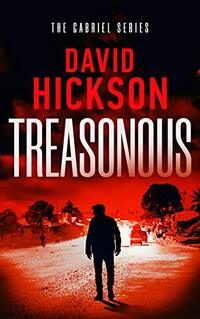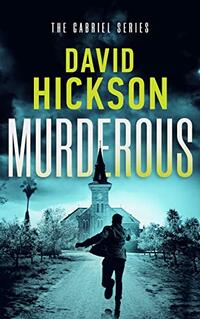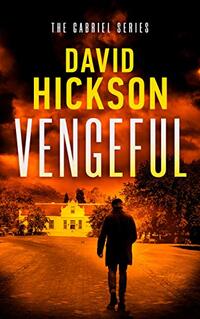Genre:
Crime Fiction Thriller Mystery Action & Adventure- Country: Italy
- Books: 3
- Profession: Writer & Filmmaker
- Born: 1 August
- Member Since: Apr 2021
- Profile Views: 8,510
- Followers: 24
- VISIT AUTHOR: Website, Join Author's Newsletter, Facebook, Twitter, Instagram, Goodreads, Amazon, Linkedin,
David Hickson is an award-winning filmmaker and writer from South Africa. His work has included internationally released feature films, television series and live entertainment television shows (he directed more live TV than was good for his health).
David travelled to Italy several years ago, an adventure that he and his family, including two young troublemakers and an assortment of spoilt domestic animals, are still enjoying. He loves walking and cycling in the hills of Italy, drinking the local wine, and telling stories that entertain and stir the emotions of his reader.
David Hickson's Books
Stay in the loop on books by David Hickson. See upcoming and best-selling books by the author here. You'll also find the deals on books by David Hickson.
** Please note that the information or price displayed here may not be the updated. Make sure to double-check the latest book price before buying books.
** Also, there might be other books by David Hickson not listed on AllAuthor.
| Book |
|---|
Treasonous: A Gabriel Series Thriller Book 1 (The Gabriel Series)by David HicksonPublish: Mar 06, 2021 |
Murderous: A Gabriel Series Thriller Book 2 (The Gabriel Series)by David HicksonPublish: Apr 11, 2021 |
Vengeful: A Gabriel Series Thriller (The Gabriel Series Book 3)by David HicksonPublish: Sep 05, 2021 |
David Hickson Interview On 27, Jul 2021
 "David Hickson spent most of his childhood in Cape Town, South Africa. His childhood dream was to be a writer. He loves telling thrilling and emotion-stirring stories. The first internationally released film that he directed was called "Beat the Drum". He started writing the Gabriel series many years ago when he was at film school. His work has been praised for bringing a South African voice to the international stage."
"David Hickson spent most of his childhood in Cape Town, South Africa. His childhood dream was to be a writer. He loves telling thrilling and emotion-stirring stories. The first internationally released film that he directed was called "Beat the Drum". He started writing the Gabriel series many years ago when he was at film school. His work has been praised for bringing a South African voice to the international stage."
I spent most of my childhood in Cape Town, South Africa. My parents were English, but had travelled to South Africa in the 1950s, long before they married, escaping the post-Second World War rations and other difficulties faced in the UK at that time. As a British colony, South Africa was an enticing opportunity and exciting place to start a new life. Cape Town was a wonderful place to grow up in the 1970’s, but also challenging. As the dark shadow of apartheid spread over the country, it affected the lives of everybody. The sense of being powerless as a child, watching my parents realise the mistakes that were being made, and injustices committed, by the government of a country they had chosen to create their future in, is a theme that informs much of my writing.
What childhood habit can you never get rid of?I have a weird obsession with numbers, and tend to count everything, from the number of steps in a staircase, to the mathematical relationship between numbers on a car’s number plate. I have never been able to shake myself of the habit of calculating the mathematical possibilities in every number that I see, which I suspect might indicate a form of obsessive-compulsive disorder! But I figure we should all be allowed a little madness.
What was your childhood dream and what are you doing now? Are you satisfied?My childhood dream for as long as I can remember was to be a writer. I remember practising visualisation routines at a very young age, having stumbled across a book in the local library that suggested it as a means to manifest one's ideal future. I visualised myself standing before a bookshelf filled with my books. Publishing my thrillers is a fulfilment of that dream, but the more I write, the bigger the dream becomes. I am very grateful to have achieved what I have, but I am not satisfied yet. I have begun to realise that writing is one of those projects that can never be considered complete. There is always another book that I want to write, improvements that I want to make to my writing, and more work to be done towards achieving the dream that still lies ahead of me.
Who is the most supportive person in your life when it comes to your writing?There are many people who have supported me in my writing, but the most supportive are definitely my two sons, who are now 12 and 9 years old. They ask me frequently how many words I have written, how far I am with my work in progress, how many books I’ve sold, and so forth. They both love to page through paperback copies of the books I have published, and pause and read paragraphs, (even though my writing is not strictly speaking age-appropriate). Writing is not an easy business, and I believe everyone needs to find their "why" to motivate them to keep at it. My "why" is my two boys, and providing some form of a legacy for them. Their support of me in this process has been invaluable.
Which was your first film that release internationally?The first internationally released film that I directed was called "Beat the Drum". It achieved extraordinary success by winning over 30 international awards, and played in cinemas around the world. It is an emotional film about a young boy orphaned by the AIDS epidemic, who travels to Johannesburg in an attempt to find his uncle. The film brought me many accolades as a director, and also pushed me to the forefront of AIDS activism in South Africa for a short while, although I saw myself more as a film director than an activist. I learnt an interesting lesson from that: as a South African writer and film director, my work is inevitably linked to the deeper underlying issues in the country. With Beat the Drum that was AIDS. And now, in my current writing, it is issues such as political corruption and the fate of a country struggling under the collapse of the system of governance. There was a time when I wished that my writing and film work could be simpler and lighter, detached from the heavier issues of a country like South Africa. But I have realised what an opportunity my birthplace has given me. Because being able to deal with such crucially important issues through the medium of entertainment is an extraordinary gift.
What do you enjoy the most about directing live entertainment television shows?Live entertainment television shows are a completely different side of my life. Most film directors work in either a single-camera or a multi-camera environment, not many of them get to enjoy both. I went to film school because of my passion for writing and telling stories and didn’t imagine I would get into live television. But on completing film school, the only jobs that were available were in live entertainment television. Directing live TV is a completely different skill to directing actors in a drama, but I found that I absolutely love it. What I particularly enjoy is that it is such a team effort. As a team you are engaged in something similar to a live musical performance. Each member of the team is vital to the successful performance. As a director it is my job to hold the team together and lead them to bring out the best in every member of the team, to produce the best possible performance. My speciality in live shows is dance. I’ve directed shows such as Strictly Come Dancing, Dancing with the Stars, So You Think You Can Dance, and many others. Directing a live TV show around live dance performances makes the entire production team a part of the performance, and that is an amazing experience. I have also specialised in beauty pageants and will never forget listening to the confirmation messages from over 50 countries as they connected to our live broadcast for Miss World, broadcast from Sanya, China. There is so much adrenalin, it is such exciting work, but also very creatively rewarding.
How did you begin writing The Gabriel Series?I started writing the Gabriel series many years ago when I was at film school. I had the idea then of a character who has been a part of “the system”, in terms of being a trained soldier who has fought for his country, but who glimpses the corruption that lies beneath the government that he is meant to be defending. He starts trying to fight the corruption in the usual way - by exposing it, and doing the things that normal law abiding citizens would do. But his failure to achieve anything by these means leads him to applying his military skills on the other side of the law. I have always been intrigued by the idea that sometimes the only way to achieve justice is by stepping outside of the law, and doing something most law-abiding citizens would consider absolutely wrong. It is this idea that forms the central theme of the Gabriel series. It comes originally from my experience when I was at university, protesting apartheid, and realising the futility of fighting a corrupt system by doing "the right thing". I still remember the initial seed of the idea for the Gabriel series, which came to me after taking part in a peaceful anti-apartheid demonstration at the University of Cape Town. The army was called in to break up the demonstration, and it turned violent. I was beaten by members of the military that swooped in behind the crowd and attacked us. For weeks after that I skipped lectures, because of the undercover policemen that watched entrances to the University for people who bore scars from that demonstration. They arrested students for taking part in an illegal gathering, and sometimes it would be weeks or months before they were released. It was during this time that I had the initial idea for the Gabriel series. And several years later, at film school I sat down and wrote about half of the first book. Then my film and TV career intervened, and it was many years later that I came back to it.
Are you friends with other authors? If so, how have they helped you in your journey as a writer?I have several author friends, most of whom I’ve met in author groups that I belong to. They are very supportive, particularly in motivating me to keep doing the one thing that every author needs to do. Which is simply to write. There are so many things involved in the writing and publishing process that it is easy to forget sometimes that the most important thing of all is to sit down and put words on paper.
As a writer producing a work of fiction, do you tend to know the ending when you start, or do you find out as you write?I always tend to know the ending, but sometimes the way in which I get there changes dramatically as the story develops. I like to plot my stories, which is probably because of my screenwriting background, where a thorough outline of the plot is usually required before any project is given the go-ahead. But I do have a tendency to change the plot dramatically as I am writing. Writers often speak about characters doing unexpected things, and my characters are no exception.
What made you decide to put your novel, Vengeful: A Gabriel Series Thriller (The Gabriel Series Book 3) on pre-order?I put Vengeful on pre-order because I think that as a reader I am more willing to give a new writer or a series of books a chance if I can see that there are further books in the series. The idea that the story has some distance to go is an appealing one to me, as a reader. As I had written my rough draft of Vengeful at the time that Murderous was published, I felt confident that I would have the book ready in time to honour the pre-order publication date.
Which place in Italy serves the best local wine?Our local wine farm! It is a lovely farm called Murola, only a 10 minute drive from our house. In Italy the wine farms sell some of their wines “sfuso” which means that they serve it on tap. We take 5-litre bottles along to the farm and have them filled up. For special occasions, I enjoy “Monacesca” a lovely verdicchio from Jesi.. The number of different wines available in Italy can be overwhelming. I recommend that anyone visiting the country find a local enthusiast, most of whom would be delighted to tell them what to try, and will probably provide generous samples as well.
What are the challenges of being an award-winning filmmaker?I think that the challenges of being an award-winning filmmaker are the same challenges that every filmmaker faces. Finding the next project! Film is probably the most expensive of all artistic endeavours, and it is a constant challenge to find the next project. One that not only excites me as a filmmaker, but also ticks all the boxes for the financial people. There are additional challenges that apply to South African filmmakers I think. As the country continues to struggle to achieve stability, and break free of the damage caused by corruption and the lingering aftermath of the apartheid era, film is still considered to be more of a luxury than a cultural necessity. And so that makes it particularly challenging.
What is your writing process like?My writing process is constantly evolving, particularly recently with all the changes that Covid has brought, and the inevitable changes in routine that having young children brings. But the constant elements to my writing process include taking frequent walks, and sitting down early to write every day. I have all my ideas while walking or cycling, both of which I love doing in the hills of Italy, as tough as that can be. I have a portable voice recorder that I take on walks with me. Whenever I am stuck on a difficult plot point in a story, I head out for a long walk with the recorder. The process of walking and talking aloud to myself inevitably brings a solution. The locals probably think I am a little mad, walking about the countryside talking to myself! Another element of my writing process includes forcing myself to sit down and write every single day, even if it is only for half an hour. Mornings are the only time that I can write. I am an early riser, and enjoy the quiet of an early morning, looking out over the Italian hills, even if sometimes I do nothing but stare at the screen until my forehead starts bleeding.
Is there anything new that you're working on? When can we expect the next book to come out?I am working on a few new things. The third book in the Gabriel series “Vengeful” is coming out in the first week of September. Then I am about half-way through the first draft of the fourth book in the Gabriel series, in which Gabriel's life gets even more complicated, and he travels further down the path of criminality. I'm also starting work on a new series, a police procedural, also set in Cape Town, with a few characters from the Gabriel series making guest appearances.
How has been your experience working with AllAuthor?My experience with AllAuthor has been great. It is so helpful to receive a new mockup of my book every week. It is so easy to forget to keep doing the small tasks that are necessary to keep things fresh for readers, and I have found AllAuthor very helpful in keeping on top of that. Thank you for all you do to support authors!
Ask David Hickson a Question
Have brimming questions to ask author David Hickson? Ask whatever you like, but keep it appropriate.
** Please note that unanswered questions will not appear on the page. Refrain from posting promotional messages.




